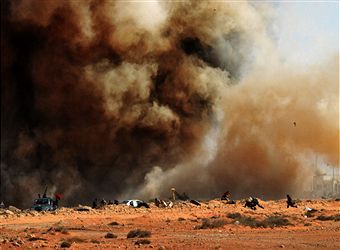 A few days into the no-fly zone and the initial aim of the intervention has been achieved: Colonel Ghaddafi no longer controls his own airspace and cannot use airpower for close-air support, intimidation or murder. But success has bred a new problem – what now?
A few days into the no-fly zone and the initial aim of the intervention has been achieved: Colonel Ghaddafi no longer controls his own airspace and cannot use airpower for close-air support, intimidation or murder. But success has bred a new problem – what now?
Should the coalition turn itself into the airborne wing of the resistance, providing support to a rebel advance on Tripoli? Or should it just continue patrolling the skies above Libya as the rebels fight on? If so, how should the coalition react when the rebels face military set-backs? Should they stand back or prevent Libyan forces from taking advantage of their tactical victories and just have DfiD deliver humanitarian assistance? President Obama says he wants Colonel Ghaddafi to go – but should he be forced out or killed?
The coalition certainly seemed confused. On Sunday Defence Secretary Liam Fox had said targeting Col Gaddafi could “potentially be a possibility”. But the head of the US Africa Command Gen Carter F Ham said attacking the dictator was not his aim. And David Cameron informed the House that the UN resolution was “limited in scope”.
The best outcome would be to open a political process that allows loyalist forces and rebel groups to shape a new Libyan settlement, which may include a confederal state. In the short-term, this may include a better-behaved Colonel Ghaddafi, ruling his Tripoli stronghold, a sort of Somaliland solution. But, over-time, he would be eased out of power or a new rebellion would probably remove him, especially if sanctions on rump Libya are left in place and the rebels roll back his forces to Sirte.
However, this would be difficult to achieve inside the current coalition. Leadership of the mission should be handed from US to Anglo-French control, while the focus should shift from the current pyrotechnic display to a limited no-fly zone. Eventually, the no-fly zone could be run by the UN, with planes from a range of traditional troop-contributors to UN peacekeeping.
Meanwhile, the UK and France should continue their clandestine support to the rebels, while DfiD should prepare to help build eastern Libya, much as it backed pre-independence South Sudan. The UN-backed coalition-run mission is not longer an appropriate vehicle for the West’s aims, and there is a real risk that many Arab states will stop supporting the action if it continues to be tactically offensive.
The NFZ is now in place; it does not need Britain and France to maintain it. But the rebels still need help and it is in the West’s interest to back them until a settlement process can begin, but help them no further. That means encouraging them to take Sirte, but probably not Tripoli: where Colonel Ghaddafi has strong support. This strategy will please neither extreme of the spectrum: not the neoconservatives who are out to kill the dictator, nor the realists who want to head home ASAP. But it may be the best option.






Comments